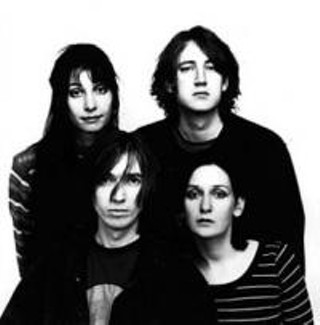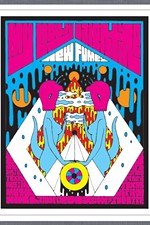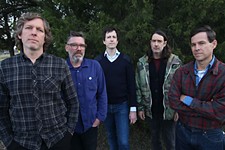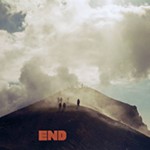An Interview with Kevin Shields
The sonic architect deals with the past
By Austin Powell, 11:56AM, Thu. Apr. 16, 2009

The aura and mystique surrounding Kevin Shields is even thicker than the wall of guitars on My Bloody Valentine’s genre-defining 1991 masterpiece Loveless. With the exception of his contributions to the Lost in Translation soundtrack and his work with Primal Scream, the reclusive guitarist has largely avoided the public spotlight since MBV officially disbanded in 1995, shelving the shoegazers’ third album in the process. Yet, in preparation for My Bloody Valentine’s reunion engagement at the Austin Music Hall on Tuesday, one of only five shows marking the band’s first American tour in 16 years, Shields shared his thoughts on the band’s return, the status of the its long-delayed reissues, and his recent collaboration with Patti Smith.
Off the Record: First off, how did the reunion come to fruition?
Kevin Shields: We were always intending to do something again. Colm [Ó Cíosóig] and Debbie [Googe] left in ‘95, and Bilinda and me were always together anyways, intending to make another record someday. We were always in touch. I would see Debbie out in London all the time. Whenever Colm would come to London we’d hang out. We always thought that we would make a record first and then play live. And then Coachella in 2006 offered us to play and we were like, "God, that’s quite a lot of money." And it wasn’t like, "That’s a lot of money we should do it." It was like, "That’s quite a lot of money, we can actually afford to do this, buy all of the right equipment for a change."
OTR: Could the reunion have happened were it not for Coachella?
KS: We realized it would be too difficult to do it when they offered it to us. It would have felt like we were just doing it for the money, so we turned it down, but that put the idea in our head that this would be financially doable, as in we wouldn’t go out there and basically embarrass ourselves. We’d be able to really have all of the right equipment and rehearse properly and do it well, which we had never done before to be honest. When we toured before, we always felt like we were working towards a situation where we could actually do what we really wanted to do, which we had done in the studio just by the sheer nature of refusing to finish records until they were finished. But live it was more making do with whatever we had. I actually hated it back then. Not playing live so much, but I hated the whole situation we were in. We didn’t have any real record company support when we toured Loveless. We got no money from the American record company on our last tour of America. We just did it by ourselves. Anyway, what happened was we did our first gigs in London and that was through ATP. We actually wound up in debt. We were a hundred thousand pounds in debt when we finished all of the British tour because we spent so much money on equipment. It was ridiculous, but we felt good about it. That was the main thing. It was the exact opposite of us going out there and making lots of money. We were really pretty high in debt.
OTR: How much did your gear cost you?
KS: Quite a lot. We spent quite a lot, but it was also the rehearsals and the whole lot. We probably spent about, let me see ... we probably spent close to 400,000 pounds, close to 600,000 dollars, not just on equipment, but on everything.
OTR: I’m sure having the right gear helped.
KS: When we made Loveless, it wasn’t so much about overdubs; it was having certain sounds and certain balances, something as simple as having Vox amps, to tour with the right kind of amplifiers. We couldn’t do that at the time. We had Marshall amps available to us, but we used Vox, Marshall, and Fender. It’s a combination of those three sounds. We just basically kind of acted like someone said, "OK, what do you want to do?"
OTR: Did you try out any new material?
KS: Not much, no, to be honest. We’re still working in the past. Even all the work I’ve done in the studio this year has largely been finishing off that record from the late Nineties.
OTR: Is that close to completion?
KS: Closer. At the time I was working on it there were about 15 to 17 tracks and there were only six or eight that I was really sure of. I was going through the process of actually narrowing it down and working on stuff and going, "You know what, this isn’t really working." Now the 11 tracks that are all going to on the record are clear. There was a reasonable amount of false starts ‘cause it’s basically half-done. It was half-made. It’s a weird process, sort of, restarting a record from such a long time ago. I had to be quite natural with it and not to rush it.
OTR: When did you restart that process and what was your first reaction in rediscovering the music?
KS: It was when I was remastering all of the My Bloody Valentine stuff from Creation. I did that in 2006, just remastered and archived everything. When I was doing that work, I came across all of the CDs from that period, the ‘96-‘97 times. That was a record that I at the time intended to finish. Then over the years, I thought, "I’ll finish this someday but I want to make a new record first." I had been listening to so much outtake stuff from the Creation time and the material is quite a bit better than a lot of the Creation stuff. It would be crazy not to finish it. It is truly a lost record that will always be in that category in that way, but it deserves to be heard. It’s actually a lot better than I thought it was. I thought it was good at the time, but I felt quite excited by the idea of just finishing it off and finally hearing it completed the way it should have been. It’s fully coherent now, but half of it is just literally in my head still.
OTR: What’s the status of the reissues?
KS: There’s a lot of problems with Sony basically. For example, here in America with Warner Brothers, we’ve never been paid a single royalty from any records we’ve released in this county, ever. The major record industry is basically in terminal decline, and each year things are getting a little bit worse and more desperate. It’s been quite difficult to deal with the record companies ‘cause the staff keeps changing, three or four regimes of staff. The people I’m working with now at Sony are good, but the first regime was insanely uncooperative to the extent that they accidentally – on purpose – lost all of the tapes. It took me a year of fighting with them to get my tapes back. They didn’t want me to remaster the stuff from the original tapes. They wanted me to use a digital source and save loads of money. You’re up against a big machine that wants to do things as cheaply as possible. The contract that they had with me forced them to do it in a very expensive way because it was an archiving deal, which meant that I was going to archive everything onto analog tape. The tape costs alone were a fortune, and they didn’t want to do that. I can only guess, but what I do know is that the tapes went missing for a year and then appeared again. Things like that slow things down.
OTR: On a personal level, what role did that process of returning to the music and so closely examining it play in this reunion?
KS: It put me into that mode again. You can ruin something in the mastering process easily, especially the way our music was mixed. I have to do the mastering. I can’t really trust anyone else to do anything really. Basically, I was in the present time choosing the way those records sound. I suppose that sort of broke the ice.
OTR: Do you think your reputation as a perfectionist is over-exaggerated?
KS: Yeah, I do. I don’t think I’m a perfectionist. I just know the difference between achieving what I want to achieve and not achieving it. You know? Most of that early Creation stuff from ’88, for example, was done very cheaply and done very quickly. It wasn’t about being a perfectionist. It was about doing what you can do in the time you’ve got. Then when I made Loveless, I decided that I wasn’t going to finish things off based on the fact that there was no more money left. I decided I would only allow things to be released when I was happy with it. That’s where I got that reputation, really from that Loveless period.
What happened in ‘88 was that something kind of grabbed me by the scruff of the neck and I knew the way everything had to be. During the Loveless process, I was completely under the spell of that. I had no choice but to do it and there was no other way to do it. Do you know what I mean? It just had to be just like that. And that’s it. I didn’t care what anyone else said. There was zero outside influence in that respect, because only I knew what I had to do … And for me, opinions of other people are important, but not above actually realizing something the way that it was supposed to be. It was just like a feeling, a mood – I was in a certain state or frame of mind. I always knew what was right. If you allow yourself to really go in a certain direction, without any outside influences, then it has a purity to it. In a way, it never gets diluted.
OTR: Is that the same attitude you have today? How would you want the next My Bloody Valentine record to be written and to sound?
KS: As I said, I’m still finishing off this one that’s an old record. Time is being really stretched to the limit. We’re still dealing with the past. For us, these gigs we’re playing are us basically doing what we always intended to do, properly. It’s hard to describe, but if you were to talk about it in terms of eras or times, it’s a period from late ’87-88 to this year really. That’s actually one period, even though there’s a giant 16-year gap. Do you know what I mean? What happens after that will be something else.
OTR: How did you come to be involved in Patti Smith’s The Coral Sea and what sort of sonic backdrop were you hoping to provide for her?
KS: She had basically discovered My Bloody Valentine, and she didn’t know that much about the group. She loved the Loveless album. There was a spirit in it that she found very attractive. She was curating a Meltdown Festival in London, and she had this concept, The Coral Sea, which is this book she wrote about Robert Mapplethorpe’s death. She had promised him that she would do something, and she choose me to be her accomplice. What we did basically was just talk one afternoon. She really got me into the mood of what she was doing. Then we went out there and performed. There was no rehearsing, nothing. It was 100 percent improvised, and we recorded it and released it. We were pleased because she hadn’t done anything like that before, and I hadn’t either. It was a huge risk, just getting up in front of an audience and playing an hour of music without any rehearsal or anything, but because of the book there was a very strong sense of direction. I just followed that and followed Patti.
OTR: One last question. Is there a title for the new album?
KS: No. I only make up titles when I have to.
A note to readers: Bold and uncensored, The Austin Chronicle has been Austin’s independent news source for over 40 years, expressing the community’s political and environmental concerns and supporting its active cultural scene. Now more than ever, we need your support to continue supplying Austin with independent, free press. If real news is important to you, please consider making a donation of $5, $10 or whatever you can afford, to help keep our journalism on stands.
Luke Winkie, Aug. 18, 2013
Audra Schroeder, April 22, 2009
Nov. 3, 2023
Sept. 29, 2023
My Bloody Valentine, Kevin Shields










